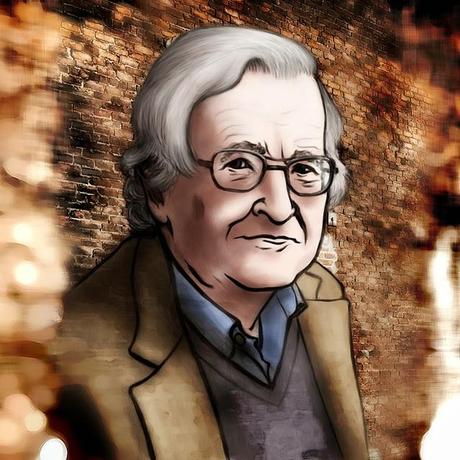 (This image of Noam Chomsky is by Jared Rodriguez at truthout.org, and is used under a creative commons license.)
(This image of Noam Chomsky is by Jared Rodriguez at truthout.org, and is used under a creative commons license.)I believe the state of Israel has a right to exist, and has the right to defend itself. But I do not believe they have the right to steal Palestinian land, or to abuse, maim, or kill innocent Palestinians. And I do not believe they have the right to keep the Palestinian people bottled up in what can only be described as a giant concentration camp. In fact, I find it shocking that only six decades after the holocaust, the state of Israel can itself commit the same kind of crimes against humanity that were committed against the Jewish people in Europe.
Noam Chomsky recently gave an interview to C.J. Polychroniou over at truthout.org. The interview covered a number of topics (ISIS, capitalism, etc.), and the entire article is worth reading, but a part of it that I found particularly interesting was Chomsky's comments on the situation in Gaza. Here is what he had to say in that interview:
Life in Gaza has returned to normalcy after Hamas and Israel agreed to a cease-fire. For how long?
I would hesitate to use the term "normalcy." The latest onslaught was even more vicious than its predecessors, and its impact is horrendous. The Egyptian military dictatorship, which is bitterly anti-Hamas, is also adding to the tragedy.
What will happen next? There has been a regular pattern since the first such agreement was reached between Israel and the Palestinian Authority in November 2005. It called for "a crossing between Gaza and Egypt at Rafah for the export of goods and the transit of people, continuous operation of crossings between Israel and Gaza for the import/export of goods, and the transit of people, reduction of obstacles to movement within the West Bank, bus and truck convoys between the West Bank and Gaza, the building of a seaport in Gaza, [and the] re-opening of the airport in Gaza" that Israeli bombing had demolished.
Later agreements have been variants on the same themes, the current one as well. Each time, Israel has disregarded the agreements while Hamas has lived up to them (as Israel concedes) until some Israeli escalation elicits a Hamas response, which gives Israel another opportunity to "mow the lawn," in its elegant phrase. The interim periods of "quiet" (meaning one-way quiet) allow Israel to carry forward its policies of taking over whatever it values in the West Bank, leaving Palestinians in dismembered cantons. All, of course, with crucial US support: military, economic, diplomatic and ideological, in framing the issues in accord with Israel's basic perspective.
That, indeed, was the purpose of Israel's "disengagement" from Gaza in 2005 - while remaining the occupying power, as recognized by the world (apart from Israel), even the US. The purpose was outlined candidly by the architect and chief negotiator of the "disengagement," Prime Minister Sharon's close associate, Dov Weissglass. He informed the press that "The significance of the disengagement plan is the freezing of the peace process. And when you freeze that process, you prevent the establishment of a Palestinian state, and you prevent a discussion on the refugees, the borders and Jerusalem. Effectively, this whole package called the Palestinian state, with all that it entails, has been removed indefinitely from our agenda. And all this with authority and permission. All with a [US] presidential blessing and the ratification of both houses of Congress."
That pattern has been reiterated over and over, and it seems that it is being re-enacted today. However, some knowledgeable Israeli commentators have suggested that Israel might finally relax its torture of Gaza. Its illegal takeover of much of the West Bank (including Greater Jerusalem) has proceeded so far that Israeli authorities might anticipate that it is irreversible. And they now have a cooperative ally in the brutal military dictatorship in Egypt. Furthermore, the rise of ISIS and the general shattering of the region have improved the tacit alliance with the Saudi dictatorship and possibly others. Conceivably, Israel might depart from its extreme rejectionism, though for now, the signs do not look auspicious.
The latest Israeli carnage in Gaza stirred public sentiment around the world increasingly against the state of Israel. To what extent is the unconditional support rendered by the US toward Israel the outplay of domestic political factors, and under what conditions do you see a shift in Washington's policy toward Tel Aviv?
There are very powerful domestic factors. One illustration was given right in the midst of the latest Israeli assault. At one point, Israeli weapons seemed to be running low, and the US kindly supplied Israel with more advanced weapons, which enabled it to carry the onslaught further. These weapons were taken from the stocks that the US pre-positions in Israel, for eventual use by US forces, one of many indications of the very close military connections that go back many years. Intelligence interactions are even better established. Israel is also a favored location for US investors, not just in its advanced military economy. There is a huge voting bloc of evangelical Christians that is fanatically pro-Israel. There is also an effective Israel lobby, which is often pushing an open door - and which quickly backs down when it confronts US power, not surprisingly.
There are, however, shifts in popular sentiments, particularly among younger people, including the Jewish community. I experience that personally, as do others. Not long ago I literally had to have police protection when I spoke on these topics on college campuses, even my own university. That has greatly changed. By now Palestine solidarity is a major commitment on many campuses. Over time, these changes could combine with some other factors to lead to a change of US policy. It's happened before. But it will take hard, serious, dedicated work.

